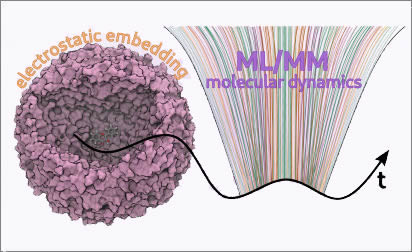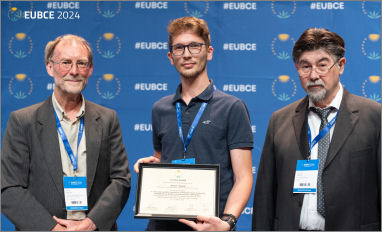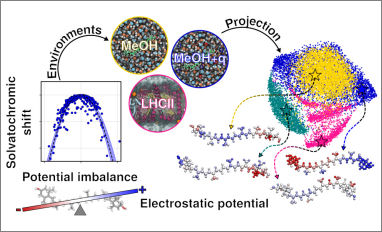
 Congratulations to our PhD students Patrizia Mazzeo and Amanda Arcidiacono for their publication entitled "Electrostatic embedding machine learning for ground and excited state molecular dynamics of solvated molecules" on the RSC Digital Discovery Journal. In this work, the authors propose a machine-learning (ML) based approach to study the dynamics of solvated molecules on the ground- and excited-state potential energy surfaces.
Congratulations to our PhD students Patrizia Mazzeo and Amanda Arcidiacono for their publication entitled "Electrostatic embedding machine learning for ground and excited state molecular dynamics of solvated molecules" on the RSC Digital Discovery Journal. In this work, the authors propose a machine-learning (ML) based approach to study the dynamics of solvated molecules on the ground- and excited-state potential energy surfaces.
 Congratulations to our Ph.D. student Alberto Picchi for his scientific publication entitled "Sustainable luminescent solar concentrators with superior photodegradation resistance employing heptagon-embedded polycyclic aromatic dicarboximides as emitters" in Materials Today Energy. Two novel carboximidic fluorophores containing 7-membered rings have been proposed for bulk LSC applications.
Congratulations to our Ph.D. student Alberto Picchi for his scientific publication entitled "Sustainable luminescent solar concentrators with superior photodegradation resistance employing heptagon-embedded polycyclic aromatic dicarboximides as emitters" in Materials Today Energy. Two novel carboximidic fluorophores containing 7-membered rings have been proposed for bulk LSC applications.
 Between 24 and 27 June, the 32nd European Biomass Conference & Exhibition - EUBCE - occurred in Marseille. Over the years, EUBCE has established itself as an international event, attracting numerous participants from around the world and featuring high-profile guests. The event primarily focuses on all aspects of biomass, including resources, research, innovation, applications, and policies.
Between 24 and 27 June, the 32nd European Biomass Conference & Exhibition - EUBCE - occurred in Marseille. Over the years, EUBCE has established itself as an international event, attracting numerous participants from around the world and featuring high-profile guests. The event primarily focuses on all aspects of biomass, including resources, research, innovation, applications, and policies.
 Congratulations to Amanda Arcidiacono, Dr. Edoardo Cignoni and Patrizia Mazzeo for the publication of their work entitled 'Predicting Slvatochromism of Chromophores in Proteins through QM/MM and Machine Learning', on the Journal of Physiscal Chemistry A. In this work the authors unravel the complexity of solvatochromism in one of the most abundant classes of natural chromophores, the Carotenoids.
Congratulations to Amanda Arcidiacono, Dr. Edoardo Cignoni and Patrizia Mazzeo for the publication of their work entitled 'Predicting Slvatochromism of Chromophores in Proteins through QM/MM and Machine Learning', on the Journal of Physiscal Chemistry A. In this work the authors unravel the complexity of solvatochromism in one of the most abundant classes of natural chromophores, the Carotenoids.



